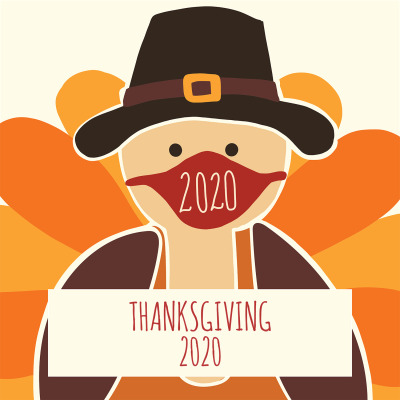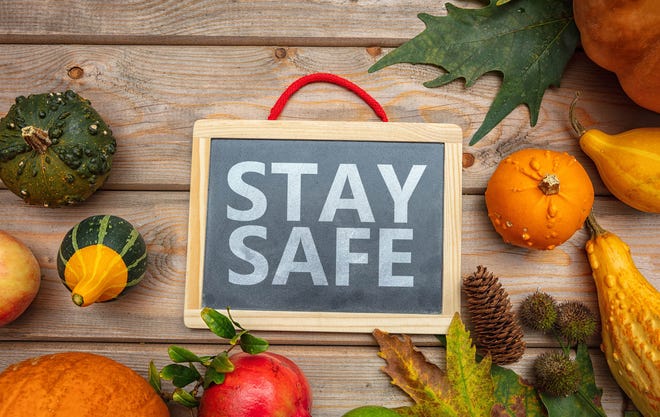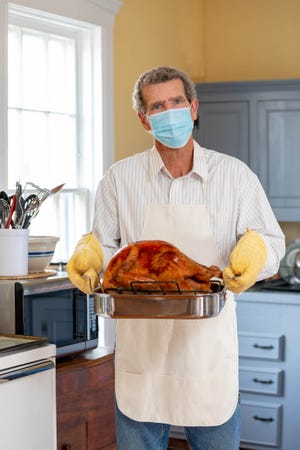

Safely in 2020 - 21

This year, we have another concern: COVID-19. Gatherings can raise exposure risk and rapidly spread through a group, rippling out to others once participants leave the holiday event. Here are some tips to help you and your loved ones stay safe through the holiday:
COVID-19
The best ways to lower the risk of COVID-19 this Thanksgiving:
- Wear face masks when you’re around others.
- Stay six feet apart
- Limit the number of people at gatherings. In NC, guidelines call for no more than 10 people at indoor gatherings. Keep in mind other places may have different restrictions and research them before traveling.
- Limit travel as much as possible. Check ahead to ensure that wherever you’re going is not experiencing a significant outbreak.
- Frequently wash or sanitize hands, especially while preparing food.
- Sanitize high-touch surfaces often.
No holiday celebration is worth risking your life or the lives of the people you love.

- If you are at an increased risk for COVID-19, stay home this year and don’t invite others into your home.
- Do not endanger elderly relatives by visiting them, especially with younger family members who may have been exposed to COVID-19 at school or working in person.
Read more here about how the CDC is recommending we celebrate the holidays this year: https://www.cdc.gov/coronavirus/2019-ncov/daily-life-coping/holidays.html
Flu
Experts are projecting a spike in COVID-19 to occur around the same time flu season is generally at its peak, which may create a strain on healthcare resources. Getting your flu shot is a big way to help ensure that doesn’t happen.
- The CDC recommends everyone who is 6 months or older get vaccinated.
- The flu vaccine is the number one way to prevent getting the flu.
Stress
As fun as the holidays can be, they can also be a very stressful time. Remember to take time to de-stress.
- Avoid self-medicating with alcohol.
- Take time out for yourself to relax and do activities you enjoy.
- Take a walk to clear your head if needed.
The months during the COVID-19 pandemic have already been stressful for many. Here are some tips for improving your mental health during the pandemic: https://www.nhrmc.org/blog/2020/03/addressing-mental-health-during-a-global-pandemic
Heart failure
Avoiding stress is extremely important for those with an underlying heart condition, so take extra good care of yourself if you’re in that high-risk category.
The American Heart Association notes that the risk of having a heart attack can be as much as four times higher in the hours after eating a large meal, especially one that is high in fat. If you have underlying conditions, a large, indulgent meal could be the trigger for a serious heart problem.
Add to that the fact that studies have found cold weather to be harder on the heart and the stress of the holidays, and the risk of a heart attack can be increased by at least 5% during the holiday season.
There are a few easy ways to decrease your heart attack risk on Thanksgiving while still enjoying the day with family.
- Avoid excess salt.
- Eat smaller portions.
- Start with vegetables.
- Avoid excessive drinking.
- Remember to destress.
- Most importantly, don’t ignore symptoms! You may not want to “spoil the holiday” by seeking care but the sooner you address an issue, the better your health outcome is likely to be.
Burns
Burns are a common reason people end up seeking emergency care on Thanksgiving.
One of the major dangers when it comes to cooking for Thanksgiving is frying your turkey.
- Always ensure your turkey is entirely defrosted and completely dried before placing it in the fryer.
- Remember, a grease fire cannot be extinguished using water. If a fire starts, cover it with a metal object like a lid or sheet pan, and use baking soda or a fire extinguisher designed to put out grease fires to extinguish.
- If you’re planning to fry your turkey, plan ahead and buy an extinguisher when you purchase your other cooking supplies.
- Try to avoid distractions or overextending yourself while cooking. Being distracted or frazzled greatly increases the odds of grabbing a pan without an oven mitt, spilling hot liquid while draining something, or forgetting to keep an eye on kids in the kitchen.
- It’s also a good idea to wait on that glass of wine or other drink until you’re done in the kitchen for the day.
Knife injuries
Knife injuries are a leading cause of medical issues on Thanksgiving. It is a time when many who do not regularly cook enter the kitchen, or when experienced cooks are distracted, stressed, or drinking.
- One of the best ways to avoid cutting yourself is to carve the turkey in the kitchen. You may picture someone at the head of the table, knife and fork in hand, carving each person a piece of turkey, but it is much safer to carve the turkey in the kitchen on a steady surface with good lighting and bring the slices to the table on a platter.
- Another way to avoid knife injuries is to ensure that your knives are sharp. It may seem counterintuitive, but a sharp knife that cuts easily through food is a lot safer to use than one that has dulled and requires more force.
Food poisoning
The biggest concern when it comes to food poisoning is food preparation.
Here are some tips, based on advice from the CDC, to help you avoid illness:
- Keep your turkey in the refrigerator in a leak-proof bag until it’s time to cook it. Make sure to defrost in advance.
- Use a separate cutting board and kitchen tools for the turkey and wash your hands after preparing it before touching anything else.
- Ensure that your turkey is cooked thoroughly using a kitchen thermometer to check that both the breast and thighs have reached 165 degrees Fahrenheit.
- It is also important to check the temperature of your stuffing, especially if it is inside the turkey. It needs to reach the same temperature as the turkey to be safe.
- Immediately refrigerate leftovers after eating and throw away leftovers after four days.
Car accidents
Car accidents tend to spike around heavy travel days such as those surrounding Thanksgiving.
- The number one way to stay safe in the car is to never drink and drive or get in the car with someone who has been drinking. Remember, a safe ride is just a few taps away with apps like Uber and Lyft, or a call away with a cab company.
- Another huge issue for those traveling during the holidays is driving while sleep-deprived. Whether you’re waking up early to make a long drive after a late night, or driving home after spending longer than planned visiting with family, remember, it’s always better to arrive late than to not arrive at all. Sleepy drivers are involved in 100,000 crashes a year, causing 1,500 deaths and more than 70,000 injuries.
Sports injuries
It’s practically a Thanksgiving cliché that after the big meal, family members head outside to play a game of football.
- Remember to stretch, warm up, and avoid overexertion while playing sports.
- This year, due to COVID-19, it’s also important to avoid physical contact, such as roughhousing or tackling, with people who are not members of your immediate household.
Domestic violence
Unfortunately, the holidays can be a time when domestic violence increases. The added stress of traveling, crowded homes (something we should all avoid this year due to COVID-19), unmet expectations, and increased spending can all lead to tensions that spark conflict.
Stay safe with these tips:
- Don’t give in to pressure to spend time with relatives you generally don’t get along with during the holidays. COVID-19 safety concerns provide a legitimate reason to excuse yourself from attending gatherings and situations where you don’t feel comfortable or safe.
- Avoid serving alcohol during family gatherings where stress could be running high.
- Avoid sensitive topics such as politics and redirect family members who bring them up in conversation.
If a situation is getting out of control, remove yourself and other loved ones if you can do so safely, and call for 911 help.
We’re here for you on Thanksgiving if you need us.
For minor injuries or illness, NHRMC ExpressCare is open every day from 8 a.m. to 8 p.m. even on holidays.
If you are facing a serious emergency, call 911. NHRMC’s Emergency Departments are open 24/7, including holidays.

No comments:
Post a Comment